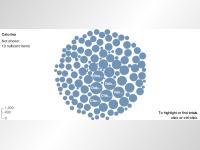
Created by an enterprising design company in the UK, Wattson and Holmes (the Brits are good with naming puns) are an elegant solution to measuring your home's energy consumption.
Wattson is the sensor unit and Holmes is the software that allows you to see snazzy graphs and data.
Utility companies have some of the worst brand reputations in the world, they get no respect because people feel they are being gouged, a tool like this could help repair their broken reputations and image.
The beauty of the device is that it makes people personally accountable for their consumption and gives them data in an easy to use and understandable format.
We need more tools like this to show people how their individual actions can make a difference.
All Wattson and Holmes now need to do is to hook themselves up to a networked community so the cumulative impact of users energy savings can be measured.
Posted by Ed Cotton
Mobile is a huge business and I am not sure we quite realize how big.
One billion + phones are sold a year!!
Worryingly, 400,000 phones a day are retired in the US.
One surely has to question the sustainability of a fashion driven business.
Bring on the modular eco phone...
Posted by Ed Cotton
This is a nice example that comes from JK Keller
Here's how he creates the visuals.
"This is a program I wrote that reads a source text and looks for words that are used repeatedly. The more the word is used, the larger its cube gets. Red cubes are words that are not unique, blue cubes are. The size of the rings is determined by the size of the paragraphs."
Found by This is That
Posted by Ed Cotton
One of the most interesting are the "death maps" which show the locations, on certain game maps, where most players get shot (as heat).
It's just one example of how rich and detailed information can be streamed and used to create a better undertstanding, based on real behaviors.
Via Super Collosal
Posted by Ed Cotton
Developed by MK12
Original pitch video here
Via Information Aesethetics
Posted by Ed Cotton
The conclusion was that there is a 14% increase in the proportion of Americans who say environmental problems are indeed a major global problem (23% in 2002 to 37% in 2007).
U.S. concern is low when looking at other advanced industrial countries, especially since we're seen by 34 of 37 countries surveyed as “hurting the world’s environment the most,” but the level of increase is still comparable.
Since the environment has been such a hot topic recently, perhaps the 2002 numbers tell more of a story. For example, even though China’s concern only rose 1% since 2002, 69% of Chinese people were concerned about the environment that year. This was the highest proportion of concern of any country in 2002 except for South Korea (73%), and Chinese citizens were three times more concerned than Americans that year.
There is evidence that China's leaders are catching up to the concerns of its people, even if only as a result of outside forces, but environmental initiatives are continuously canceled out by colossal economic plans.
For instance, new vehicle-emissions regulations are in the works, but they cannot match the exceptional rate of growth in the number of cars (projected to surpass the U.S. at 130 million vehicles by 2020), due to a policy to promote the domestic car industry.
So when will the U.S. approach the higher echelons of concern, if ever?
Hopefully our 14% increase signifies something bigger: that the level of concern in a country won’t always have to correspond with its level of pollution.
Posted by katie facada


